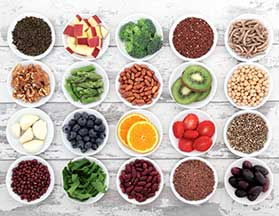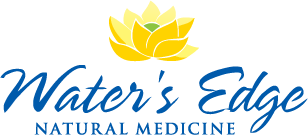Dietary Fiber in Pioneer Square - Seattle, WA

We've all heard the patronizing appeals: make sure you're getting enough fiber. But what is dietary fiber, and why is it so impactful on your health? Fiber, also called roughage or bulk, is a plant-based substance often found in food (dietary fiber) which helps you control your weight by making you feel full faster. It also helps with digestion and helps prevent constipation. You can find fiber in whole grains, nuts, seeds, fruits and vegetables. The American Heart Association Eating Plan recommends an intake of 25 to 30 grams a day. However, the current fiber intakes among adults in the United States average about 15 grams a day, about half the recommended amount.
To schedule a consultation with a nutritionist in Pioneer Square - Seattle that can discuss the benefits of dietary fiber and how to incorporate it into a healthy nutritional plan, call (206) 966-4522 or contact Dr. Marina Abrams online.
Insoluble and Soluble Fiber
There are two general forms of fiber, both of which are important for health, digestion and preventing diseases. These are:
Soluble fiber: Fiber which dissolves in water. This type of fiber changes as it progresses through the digestive tract, where it is fermented by bacteria, and becomes gelatinous as it is absorbed by water. Soluble fiber reduces cholesterol (especially bad cholesterol) and regulates sugar intake (especially for individuals with diabetes and metabolic syndrome).
Insoluble fiber: Fiber which does not dissolve in water. This type of fiber does not change form as it progresses through the digestive tract. Insoluble fiber promotes regular bowel movements and prevents constipation, while also speeding up the elimination of toxic waste through the colon and preventing microbes from producing hazardous substances that can lead to colorectal cancer. As a prebiotic, insoluble fiber also promotes healthy gut bacteria which is also crucial to overall gut health.
Below is a list of high fiber foods which you should consider adding into your diet!
| Soluble Fiber | Insoluble Fiber |
|---|---|
| Legumes (beans, lentils, peas) | Legumes (beans, lentils, peas) |
| Whole grains (oat, bran, barley) | Whole grains (wheat bran, wheat germ) |
| Vegetables (Brussels sprouts, asparagus, turnips) | Vegetables (beets, parsnips, turnips, onions, artichokes) |
| Fruits (pears, apricots, grapefruit, oranges, apples) | Fruits (skins, berries) |
| Nuts and seeds | Nuts and seeds |
| Greens (spinach, lettuce, kale) |
Benefits of Dietary Fiber
A high-fiber diet comes with a number of benefits, including its potential to:
- Normalize bowel movements and maintain bowel health: Dietary fiber simultaneously increases the size of your stool and softens it, decreasing your chance of constipation. By doing this, dietary fiber also helps increase the health of your bowel, and reduces your chance of developing hemorrhoids and small pouches in your colon (diverticular disease).
- Lower cholesterol levels: Soluble fiber has the potential to lower low-density lipoprotein, or "bad" cholesterol levels, as well as reduce blood pressure and inflammation.
- Control blood sugar levels: Fiber decreases the absorption of sugar to help improve blood sugar levels, which is particularly useful for those suffering diabetes. A high-fiber diet may also reduce your risk of developing type 2 diabetes.
- Help you achieve a healthy weight: High-fiber foods are generally more filling than lower-fiber foods, ultimately resulting in eating less and staying satisfied longer. This causes you to consume fewer calories for the same volume of food, a recipe for maintaining a healthy weight.
Creating a High-Fiber Diet Plan
To reap the full benefits of fiber, it is important to incorporate both insoluble and soluble fiber into your diet to improve your overall health. The recommended amount of insoluble fiber is 75%, while 25% soluble fiber is recommended (in other words, 3 parts insoluble to every 1 part soluble); however, foods like oat, oat brans, psyllium husk and flax seed are recommended as they are rich in both types of fiber.
Electing a high-fiber diet is easier than you might think. To naturally incorporate fiber into your daily routine begin incorporating more vegetables and legumes into your daily meals. While certain fruit like berries and apples have a good amount of fiber, they are also high in sugar. Limit your fruit consumption to small snacks throughout the day. Resist the urge to buy prepackaged "high fiber" foods out of convenience; these foods typically have lower nutritional value and are packed with sugars, artificial ingredients and unnecessary calories.
High-fiber foods should be incorporated gradually to prevent intestinal gas, abdominal bloating and cramping. High-fiber supplements exist and should be discussed with your healthcare provider, who is best equipped to assess your current health situation and decide whether high-fiber supplements could benefit you or whether incorporating a high-fiber diet will suffice. Whatever the course you take, it is important to meet with a healthcare provider who can provide sound dietary advice. To schedule a consultation with a nutritionist in Pioneer Square - Seattle that can discuss high fiber foods and how they benefit you, call (206) 966-4522 or contact Dr. Marina Abrams online.
Water's Edge Natural Medicine
Address
1000 2nd AveSuite 2920
Seattle, WA 98104
(206) 966-4522
www.naturopathic.com
Hours
Mon:
9:00 am - 4:00 pm
Tue:
9:00 am - 4:00 pm
Wed:
8:00 am - 3:00 pm
Thu:
9:00 am - 4:00 pm
Fri:
8:00 am - 12:00 pm
Sat:
Closed
Sun:
Closed


